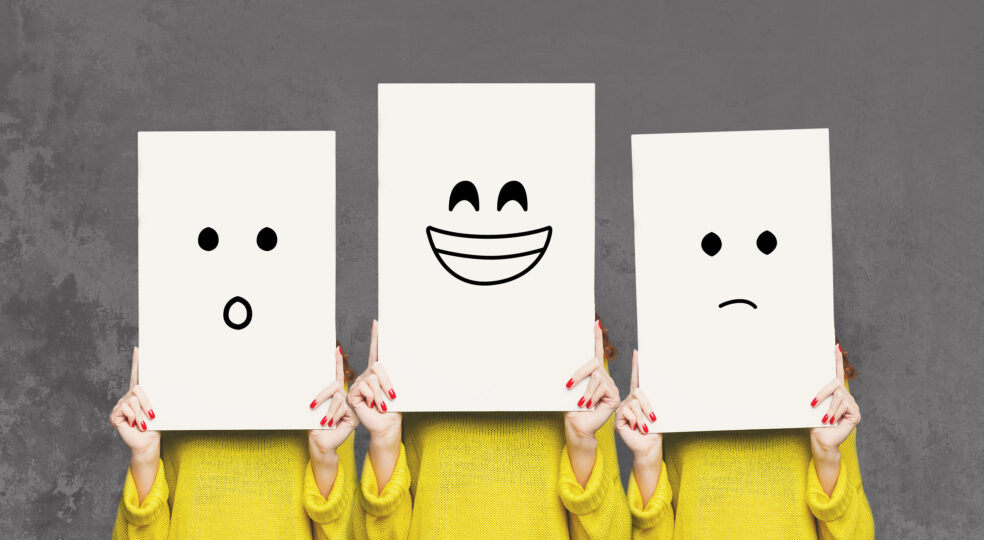
Hardly anything influences us as strongly as our emotions. Emotions have an enormous power that we are often not even aware of. Feelings of happiness let us float on cloud nine and nothing and no one can spoil our mood. We are completely happy and relaxed.
But then there's anger, sadness, fear, Disappointment and all their followers. They can really ruin our day and throw us completely off track. At one of these moments, you've probably asked yourself why these stupid feelings have to live through at all. Can't they just be pushed aside?
Yes, as a matter of fact, you can. But it's not the best solution. Basically, you have a choice: Either you suppress your emotions or you learn to control them. Let's take a closer look at what exactly this is all about.
It would be so nice if you could just turn off feelings sometimes, don't you think? Basically, this is possible, because we are all able to suppress emotions and to banish them completely from the "tangible". Sooner or later, however, this can become quite dangerous. Why? Because you eat them up inside yourself and don't work them out.
This may work for a short period of time, but in the long run, you're not doing yourself any favors. Suppressing emotions is a defense mechanism that we all use from time to time to protect ourselves. However, it's important to bring them back out and work through them. But if you stay in your old pattern and only eat more and more into yourself, you can expect a big breakthrough at some point - in the negative sense: Sooner or later the feelings will burst out of you like a fountain and overwhelm you.
All the suppressed emotions flood you all at once and coping with this concentrated force is anything but easy. Psychological studies show that the Suppressing feelings can lead to aggressive and anxious behavior. So more and more emotions are added, which you then suppress again and the bomb ticks faster and faster. All of this can according to studies even have a negative effect on your health and cause high blood pressure, among other things.
One thing is clear: controlling emotions is clearly the healthier option. You are no longer helplessly at their mercy, but you also don't close yourself off from them and become a block of ice. After all, our feelings are what make us human, aren't they? But what distinguishes controlling emotions from suppressing them?
Controlling emotions means allowing them to some extent. You become aware of your feelings, perceive them, and accept them as a part of you. But how intense you feel them and how long they last is up to you. In professional circles, this is called "emotion regulation".

You can control your emotions, at least up to a point - modern psychology is convinced of that. Why is that possible? Because you can specifically train and reshape the areas of your brain that are responsible for this control. Emotion regulation is an important skill for the Self-control. Whenever emotional outbursts are simply not appropriate, for example because you are in an important meeting, take the reins and learn to control your emotions.
But don't worry, that doesn't make you an emotionless robot. You simply decide for yourself which feelings you let get the better of you and which ones you don't. If it's just inappropriate, you give in to your emotions at another time and then reflect on them.
The so-called "ABC of emotions" is important here. The 'A' stands for the situation you find yourself in. The "B" marks how you evaluate it and the "C" marks the feeling that spreads through you. It is not just the situation that is responsible for your feelings. How you categorize the event also plays a very important role. However, if you are able to reflect on why the situation is triggering you, you will learn to control your emotions better and better.
"B", the evaluation of the situation, is the crucial point, because here you can intervene. How you evaluate a situation is entirely up to you. Let's make this more understandable with an example of emotional control. Imagine your partner is meeting friends at a bar in the evening and you are staying home. It's now past midnight and you still haven't received a reply to the message you sent over an hour ago - that's the situation.
Now it's up to you to evaluate it. Do you tell yourself that your better half is busy flirting with someone else, or do you assume that he or she is just having a good time with friends, engrossed in conversation, and simply didn't see your message? The version you choose will greatly affect the emotions that develop. Will it be anger, jealousy, and sadness, or will you remain completely calm because you know your loved one is faithful to you?
So the "ABC of emotions" is a very important tool for controlling your emotions. That sounds way too simple to be true? It is. But sometimes it's not that easy. As is often the case in life..: "Practice makes perfect." Because of course, older experiences that shape you to this day play a prominent role in this moment. But first, let's take a look at the benefits it all delivers to you.
Those who master controlling emotions are always able to stop emotional outbursts when the situation just doesn't allow them. Handy, isn't it? But that's not the only benefit you'll reap. Read for yourself!

Finally, it's time to get down to business. We'll show you how to keep your emotions in check, even if it's incredibly difficult for you right now.
Surrender to your feelings for a brief moment and feel what they do to you. Where do they arise? Do they give you a headache, an uneasy feeling in your stomach or do they perhaps even give you a stab in the stomach? Heart? Only if you are really aware of your emotions will you not bottle them up. How long and how intensely you do this is up to you. Sometimes it helps to close your eyes for a short moment. Take three deep breaths in through your nose and out through your mouth. Tell yourself: everything that is there is allowed to be there!
You decide about your emotions and no one else. It is entirely up to you how you evaluate a situation and what feelings result from it. And that's exactly why only you can bring your emotional world to rest.
So don't blame others involved in the situation for possible emotional outbursts, blame yourself first. You are the person who is in control. Analyzing the triggers is a different kettle of fish.
Take your time and think about what thoughts were going through your head before certain emotions arose. Sure it helps you toto review the situation once again. What was the situation that started it all? How did you assess it?
Since your thoughts have a special influence on your emotions, it is very revealing to look at them again in retrospect. In this way, you will gain important insights that will help you to better control your emotions next time.
If thoughts influence feelings, it's only logical to start with thoughts, isn't it? After you have reflected on them once again and found out what you could have done better, it's time to put them into practice. You alone decide what you think. You can use this to Emotion at least in part.
A person has disappointed you? Of course, it's not nice, but try to put yourself in their position. What reasons did she have for acting the way she did? Would you even have done the same thing? Even if this doesn't make your disappointment completely disappear into thin air, it will turn into understanding, at least in parts. And what had you so enraged just a few minutes ago may slowly fizzle out.
Imagine the following scenario. You go to the gym regularly and see other people who are fitter than you, and you let that drag you down. Why do you make it so easy for negative feelings? Take care of yourself. Stay with yourself, stay with your goals, and realize what you've already accomplished! Even the fittest of the fit started out like you did - and the thought is much more motivating, isn't it?
We all know it, that inner voice that keeps reminding us of unpleasant situations and doesn't let us forget this morning's anger. How often do you go through all the reasons with it why you were justified in getting angry? By doing this, however, you are unnecessarily dragging out the emotion and putting yourself into a negative energy that blocks you. But if you manage to get rid of this to interrupt the inner monologue and look at your feelings more objectively, you've won.
Yes, it's easier said than done. But small breathing exercises can help you to symbolically push away excessive emotions. This also has an effect on your mind. So breathe deeply into your belly and consciously follow the path of your breath.
Visualize how it collects all the emotions you want to be more in control of as it moves through your body. Then exhale for as long as you can. With the air, all the turmoil in your body will leave you and your emotions will go down a bit.
Exercise is always good for us, especially in the fresh air. Here you can let your thoughts run free, analyze your emotions and clear your head again. So, how about a walk through the city park again? Exercise has been shown to contribute to mental health, which in turn helps you to better process and control your emotions.
You can't control your emotions, no matter how hard you try? Maybe that's the problem: you're putting too much pressure on yourself. Take your time to gradually gain control over your emotions. This won't happen overnight. The whole thing is a process in which you also learn a lot about yourself.
The insights you gain every day about yourself, your thoughts and the feelings they trigger will always move you forward. No one is born a professional, no matter what it's about, remember that. Pressure is not the way to go. Neither is habit, for that matter. You thought you had the hang of it at first, but over time you lose control again?
Meditation is known for its many positive effects on the mind and body - also to be able to control your emotions better. Scientific studies by renowned universities and research institutes show that meditation helps us to cope with stress and the fast pace of life: Meditation helps us to face the stress and fast pace of today's world with more composure - out of survival mode and into the Relaxation.
You want to learn more about it? Then sign up for the free Meditation Challenge on. Over the next five days, we will take you by the hand to introduce you to the topic of meditation. For each day, we will give you a Meditation to help you find your inner center.

